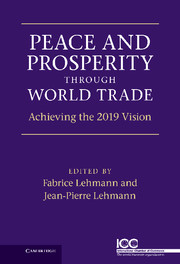Book contents
- Frontmatter
- Contents
- Notes on contributors
- Foreword
- Preface: the ICC vision
- Historical overview and dynamics
- Editorial note
- A Global systemic transformations
- B Governance of global trade
- C Poverty and global inequities
- D The long view on interlocking crises
- E Global business responsibilities
- Editorial introduction
- E1 Responsible leadership
- E2 For great leadership
- E3 A lesson on trade, regulation and competition policy?
- E4 International trade and business ethics
- E5 Who's driving twenty-first century innovation? Who should?
- E6 Responsible sourcing
- E7 Trade, international capital flows and risk management
- E8 Trade, corporate strategies and development
- E9 How can trade lead to inclusive growth?
- E10 Trade and human rights: friends or foes?
- E11 Trade: the spirit and rule of law
- Conclusion: the imperative of inclusive global growth
- Index
E11 - Trade: the spirit and rule of law
Published online by Cambridge University Press: 05 July 2011
- Frontmatter
- Contents
- Notes on contributors
- Foreword
- Preface: the ICC vision
- Historical overview and dynamics
- Editorial note
- A Global systemic transformations
- B Governance of global trade
- C Poverty and global inequities
- D The long view on interlocking crises
- E Global business responsibilities
- Editorial introduction
- E1 Responsible leadership
- E2 For great leadership
- E3 A lesson on trade, regulation and competition policy?
- E4 International trade and business ethics
- E5 Who's driving twenty-first century innovation? Who should?
- E6 Responsible sourcing
- E7 Trade, international capital flows and risk management
- E8 Trade, corporate strategies and development
- E9 How can trade lead to inclusive growth?
- E10 Trade and human rights: friends or foes?
- E11 Trade: the spirit and rule of law
- Conclusion: the imperative of inclusive global growth
- Index
Summary
Often referred to but seldom defined, the rule of law is much more than a mere legal concept. As developed by the Enlightenment thinkers, it sets certain requirements regarding the organization of the state, in particular the separation of powers. Today, in addition to its political and institutional meaning, the economic dimension of the rule of law is widely acknowledged, and it is considered to be a key component of a sound business environment. The rule of law calls for the existence of transparent, predictable, general and enforceable laws. It also implies that laws be applied in a fair and coherent manner by governmental bodies, whose actions can be challenged before the courts. Under the rule of law, the enforcement of rights and obligations is guaranteed by an independent, well-functioning and accessible judiciary. These elements provide safeguards against arbitrary decisions, contribute to deter corruption and ensure that contracts can be enforced. They are part of a good investment climate and may – in a long-term perspective – contribute to growth and economic development. The rule of law is indeed only one factor among others for prosperity – many countries have developed despite a weak rule of law; however, in the long run, a deficient legal framework and weak institutions can only have a negative impact on an economy.
While traditionally considered primarily as a matter of domestic governance, the rule of law has gained relevance in the international context as well since the second half of the twentieth century, when an unprecedented expansion of international law took place and the major multilateral institutions were created.
- Type
- Chapter
- Information
- Peace and Prosperity through World TradeAchieving the 2019 Vision, pp. 284 - 288Publisher: Cambridge University PressPrint publication year: 2010

